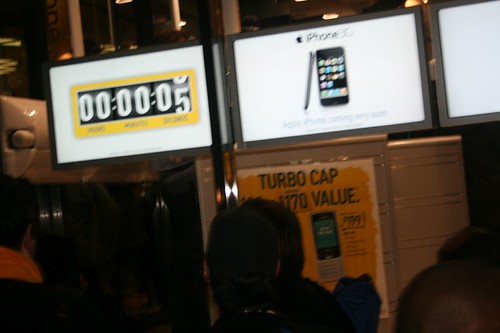The Optus outage was like an old South Park episode – only the serious and costly disruption unleashed was LOLs-free
Optus #Optus

There’s a South Park episode from season 12 in which the town falls to chaos when the internet inexplicably stops working – and on Wednesday Australia woke up in it. Optus, one of Australia’s wireless carriers, was struck by a nationwide outage that commenced at 4am.
Our household didn’t know this detail when I woke to the sound of my husband in a frenzy of computer recabling as he tried to prepare for a 9am meeting.
When he grasped this was an infrastructure failure, not an equipment one, he seemed to absorb himself into the strange, Silent Hill-stillness permeating the house. I found him at the dining table trying to negotiate Schrodinger’s Meeting Apology, and somehow explain to his colleagues that his phone wasn’t working but without use of his phone. It was only then I realised my own Telstra-connected mobile was perfectly functional. Telstra. Functional. If this was a real episode of South Park, my character’s head would have exploded. I’ve lived in regional Australia for most of my adult life; for years, screaming at the post-privatisation Telstra to fix something was akin to a part-time job. We really had slipped into a parallel world.
Like Telstra, Optus was also once a state-owned enterprise. Formerly Aussat, it was a satellite communication network used for military and civilian purposes – in the latter case, delivering television services to remote outback communities. Amid privatisation mania, Aussat was coupled with a telecommunications licence and sold off in 1991. The idea was to “provide competition” to the then state-owned Telstra forerunner Telecom. The insistence of neoliberal privatisationeers is always that handing essential services to commercial operators will improve their efficiency and ha ha ha ha, let’s recap the efficiencies of Wednesday.
The woman besieged by her own cats when their wifi-enabled feeder turned off was kind of adorable … but small businesses losing trade due to the failure of their Optus-enabled Eftpos connections was curiously LOLs-free. In a country barely using cash since the pandemic, some businesses desperately accepted written IOUs from customers just to stay operational; other shops closed. Banking services were inaccessible. Those dependent on wifi connections for health monitoring were left vulnerable, as were entire hospital networks which lost their communications; one internet friend wrote to me with the sad news he was one of many who couldn’t contact his hospitalised child, patients couldn’t contact their clinicians, clinicians couldn’t contact patients. Another friend didn’t get timely news of a family death. Emergency services were compromised and the government had to activate a protocol to allow triple-0 phone calls to “camp” on rival telecommunications networks – with dangerously reduced coverage. Parents couldn’t be contacted by schools. The Victorian train system was in chaos and beset by extreme delays, ride-share systems went down. Work-from-homers couldn’t work from home, other workers couldn’t get to work, casual workers couldn’t be contacted for shifts, delivery drivers couldn’t access maps, entire government departments were uncontactable … and 10 million Optus customers didn’t even know why it was happening unless they had a mate with a Telstra plan.
Not that Optus really had an explanation – though it was curious they were able to make their “yeah, sorry, we don’t know what’s going on, either” statements at all, given one would think that they would all be on Optus phones. The Optus CEO, Kelly Bayer Rosmarin, has rendered herself something of a contemporary icon with her leadership of the company in this latest crisis. As the same CEO who kept Gladys Berejiklian in the Optus senior leadership team after the former NSW premier was found liable by a corruption inquiry for “serious corrupt conduct”, presiding when only last September 9.8 million Optus customers had their sensitive personal data hacked by cybercriminals, and now this, she has achieved the social equality victory of proving herself incompetent as any man. Smashed it, champ!
Reading between the lines of statements from the minister for communications, Michelle Rowland, her direct advice that customers “keep receipts” and pursue compensation from the company with the ombudsman might translate as the public official’s equivalent of swearily threatening bodily dismemberment. Her government has wasted no time announcing an inquiry into Optus’s unprecedented performance of epic shitshowery.
What the government may feasibly be able to do about its post-privatisation problem children – let’s remember that Qantas was also once a state-owned enterprise – is limited while they remain commercial operations beyond public control. Optus isn’t even an Australian company any more – it’s a wholly owned subsidiary of Singaporean telco Singtel.
skip past newsletter promotion
Our Australian morning briefing breaks down the key stories of the day, telling you what’s happening and why it matters
Privacy Notice: Newsletters may contain info about charities, online ads, and content funded by outside parties. For more information see our Privacy Policy. We use Google reCaptcha to protect our website and the Google Privacy Policy and Terms of Service apply.
after newsletter promotion
The reason the state used to own and operate essential services was because historical experiences like the second world war affirmed maintaining the system integrity of critical infrastructure depended on making governments accountable for their management.
Australia might be an island continent but we are part of a world in which we presently have allies and enemies engaged in active warfare. The consequence of handing critical infrastructure to distant corporations has just been witnessed by all: Just turn off our internet … and Australians will be goners.
Van Badham is a Guardian Australia columnist